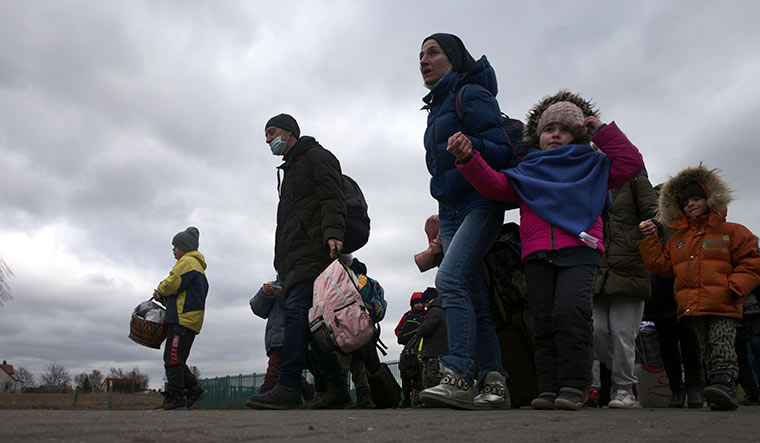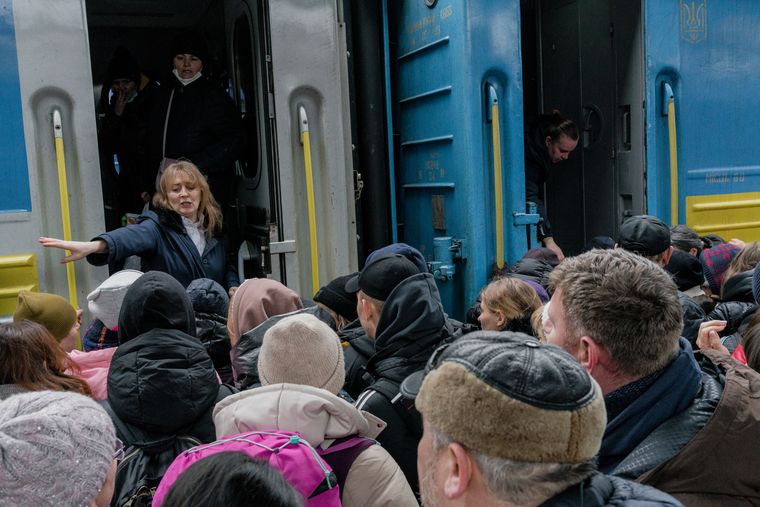Valentina Quinn has spent more than a week at the Warsaw West train station, distributing food and clothes to thousands of fellow Ukrainians arriving from across the border. She thanks her stars for having moved to Poland much before the war started.
When asked about her parents and siblings, she said they were trapped in Ukraine. “My father is disabled, he cannot walk,” she said. “He cannot even go to the shelter. My mother is with him in their fourth floor apartment in Poltava, a town in Ukraine’s east central region. They have sent my sister to the shelter.”
Safely away from Russian shells and bullets, Valentina has no time to cry. “I am here to support my people to fight the war. People are running away; some have lost their homes.”
She has stopped watching the news, fearing that it cannot be good. She knows that the Russians have not made much progress even after two weeks. She knows that Kyiv is still holding on, with the Ukrainian army and citizens putting up a brave fight, led by President Volodymyr Zelenskyy. In a defiant address to the British parliament on March 8, Zelenskyy invoked World War II hero Winston Churchill, saying, “We will fight in the forests, in the fields, on the shores, in the streets. We will fight to the end.”
Valentina’s hosts, the Poles, should know. For it was Hitler’s invasion of Poland that was the last straw for Churchill’s predecessor, Neville Chamberlain, who issued the ultimatum (to Germany) that started the war. But today, Europe does not have a leader to send such an ultimatum. Zelenskyy’s desperate pleas for NATO to get involved have invoked little response. The European Union and many of its members, including Germany, have offered arms; Poland has offered its old Russian-made MiG-29s.
That is all. And the Americans will not allow the Poles to send the MiGs. Zelenskyy’s request to declare the Ukrainian airspace a no-fly zone has been rejected by NATO, which has among its members three nuclear powers and some of the world’s richest and powerful countries. NATO’s assessment is that if it declares a no-fly zone, and if Russia violates it, its aircraft and missiles will have to intervene. That would escalate the war into—who knows?—a Third World War!
Perhaps, the most hostile signals are coming from Hungary, led by Prime Minister Viktor Orban, who is known to have a soft corner for Russian President Vladimir Putin. Orban, ridiculed as “Putin’s poodle” by the Hungarian opposition and the western media, has allowed NATO troops to be stationed in Hungary. But he has flatly refused to send arms to Ukraine, and has declared that he would oppose any move to admit Ukraine into NATO. “Hungary’s goal is peace, and that is why we refuse to supply arms to Ukraine and block military supplies to cross our territory,” said Tibor Kovács, former director of the Hungarian Information and Cultural Centre, New Delhi, over phone from Budapest. “Hungary, being a member of both NATO and the EU, has obvious obligations towards these organisations, but it also has the right to act according to its security and policy.”
There are other reasons, too. “One reason this conflict had not happened earlier was that Hungary kept vetoing Ukraine joining NATO,” said Kovacs. “The reason for this is the treatment of the Hungarian minority in Ukraine. Their law deprives the minorities in Ukraine—including the two lakh Hungarian minority—of the right to study in their mother tongue. Hungary is obliged to secure these rights. The situation occurred after World War I when Hungary was penalised for being on the “wrong side”. We lost two-thirds of our original territory and one-third of our population which became part of the neighbouring countries that were created and benefited from annexations after the war.”
NATO says it is taking defensive and proportionate steps in response to the changing security environment. To the Ukrainians, who share borders with four NATO members— Poland, Hungary, Slovakia and Romania—it means that the organisation would take up arms only against threats to its members. That includes Poland, which was once an ally of the Soviet Union. US Secretary of State Antony Blinken reiterated NATO’s support to the Baltic states, Lithuania, Latvia and Estonia, during his visit to the region on March 7 and 8. The three erstwhile Soviet republics are worried that Russia could target them next for joining NATO. Ukrainians, however, view Blinken’s assurances only as NATO guarding its own back.
It was Poland which had taken the lead in breaking free of the shackles of communism back in the 1980s, with its Solidarity movement. Poland’s audacity, in fact, encouraged other Soviet allies to step out of the ‘Iron Curtain’ and join NATO. Again, it was Poland that led the rest of the world in recognising Ukraine as an independent country after it walked out of the Soviet Union. The Poles, therefore, think that they have a moral duty to help Ukraine in this moment of crisis.
“I was the spokesperson for Poland’s foreign ministry when Ukraine declared independence,” said Grzegorz Dziemidowicz, former director of the Polish National Diplomatic Academy. “Poland was the first country to recognise Ukraine; I wrote the announcement regarding this. It was an absolutely special moment in Kyiv, as they stopped radio and television programmes in order to read the Polish declaration and support for Ukraine.”
With NATO throwing up its hands, Hungary remaining hostile and others not so keen, the Poles have resigned to bearing the brunt of Europe’s worst humanitarian crisis after World War II. Nearly half of the two million Ukrainian refugees have landed in Poland through the border points at Budomierz, Shehyni Medyka and Krakowiec. Kind Polish families are offering them meals and room. The government, too, is helping out. “Polish citizens who take Ukrainian refugees into their homes would be eligible for financial support for two months. They will be paid 40 Polish zloty per person per day (around 0700),” said Dziemidowicz. “The refugees will have to register themselves by showing their passports.”
Not that others are doing nothing. “Thousands of students, including Indians, arrived in Hungary and were taken to safety by the Hungarian and Indian authorities and volunteers,” said Kovacs. “The whole population and the administration stood up as one to relieve the difficulties these people face. They have been given food, accommodation and clothing. Special care is given to families with babies. All are being given information as to how to move on, and find their friends and relatives.”
Poland is discussing a new law that would give legal status to Ukrainians who crossed over after February 24, the day on which Putin’s tanks rolled into Ukraine. That would entitle them to jobs, schools and social security. But that could also attract charges of racial discrimination as Poland had refused entry to refugees from the Syrian war.
The Ukrainians know that the recent pause in the Russian offensive is only a tactical one, forced on the Russians by military requirement rather than resistance from the Ukrainians or ethical considerations. “The final push could come any moment,” said a woman whose son is staying back to fight the Russians. “It is only a traffic jam to the north of Kyiv that is delaying the Russians.”
Or is there more? The Russians have given several offers of escape corridors for civilians trapped in Ukraine’s besieged cities. Anyone coming out unarmed would have a safe passage, according to the Russians. The invaders apparently know that they cannot go on killing the citizens, as they would be accused of a genocide. They would rather let the citizens get out and then take the cities. It is territory that Putin wants, not people.
The first two pauses failed. Hardly anyone came out through the corridors, and both sides blamed each other. Ukraine alleged that the Russians attacked the few civilians who attempted to come out in Mariupol. Russia, meanwhile, accused the Ukrainian army of using civilians as human shields by forcing them to stay, while Ukraine said the ceasefire was a farce. “An immoral stunt,” said Ukraine, pointing out that the corridors from Kyiv and Kharkiv, the country’s two largest cities, led to the Russian border where Ukrainians did not want to go.
Ukrainian authorities have stopped the country’s able-bodied men from crossing over. “My father, Sergey, could not join us because he was asked by the authorities to join the fight,” said engineering student Sofia, who landed in Warsaw with her mother, Natalia, younger sister Maria, and the family’s god-daughter, Alice. But she is also happy that he would be there to look after her grandparents in Kharkiv, who are too weak to travel.
At border points, men are turned away and pushed back into Ukraine. Women and children are given priority followed by foreigners, including several thousand Indian students. The 694 Indian students stranded in Sumy have finally broken out into the safety corridor. “The third pause in the operation has been helpful,” said Natalia.
More than the march of Russians, what the Poles and the rest of Europe worry about are the after-effects of the sanctions. “Russia delivers most of Europe’s oil and gas,” said Dziemidowicz. “It is a problem now. Look at a country like Bulgaria, a member of NATO and the EU. Without Russian gas, it just cannot exist.”
All the same, Europe’s hope is that the pain of the sanctions will tame Russia, as would moral and political pressure from neutral nations like India and China. “After all, the two fast-growing economies cannot afford a global economic breakdown,” pointed out a Polish diplomat. “To that extent, most of Europe also welcomes India’s neutrality. More than anyone else in the rest of the world, it is India and China who need the world economy to grow at this juncture.”
Two weeks into the war, Ukraine has also begun to give up on its NATO dream. Zelenskyy has indicated that he is willing to give up the membership demand, and is even willing to negotiate over the two Russian-majority provinces that Moscow has declared as independent states.




